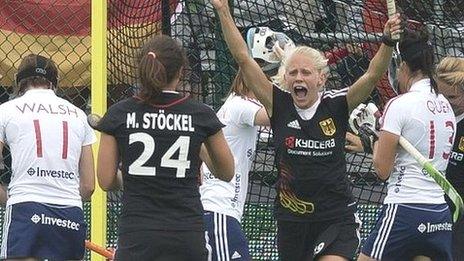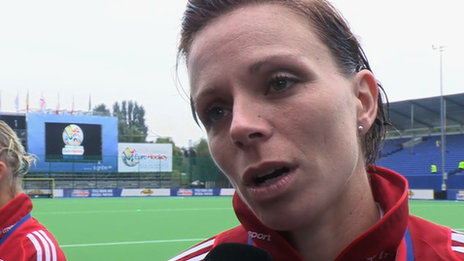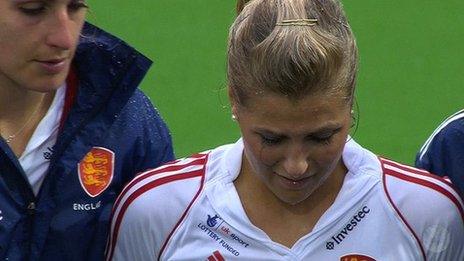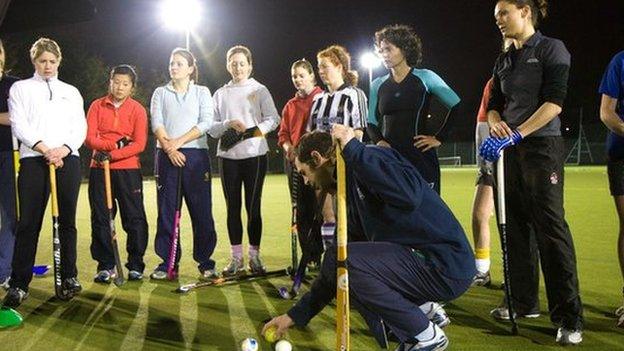EuroHockey: Beaten England emotional but defiant
- Published
EuroHockey 2013: Germany 4-4 England (2-0 pens)
Commiserating with team-mates in a miserable, soggy huddle; Kate Walsh has been here before.
As their German conquerors bounded around the EuroHockey field in celebration on Saturday, England consigned another year to the locker without a major tournament win.
All of 22 years have passed since England beat Germany to European gold in 1991. Those were the last English women to wear gold medals. Today's veterans were not even teenagers at the time.
Saturday had been a huge chance to rectify that - England went ahead inside three minutes before embarking on a gripping, helter-skelter half where seven goals were scored, leaving Germany 4-3 up at the break.
Lily Owsley equalised deep into an otherwise attritional second half to force a penalty shootout, and there the English dream died in driving rain.
Tears streamed down already waterlogged faces. Walsh, the side's 32-year-old captain and perhaps the world's best player never to win a title, cracked when asked if it will ever happen for her.
"I have absolutely no doubt that this squad has got a gold medal in it," she insisted, through gulps.
EuroHockey 2013: England 'devastated' after Germany defeat in final
"I know that we have got a lot more to give, and we are going to get there.
"It might not be in my lifetime," she sighed, "it might be in the future, but I believe we'll get there."
In the hours after the game, as the small stadium in idyllic Belgian parkland cleared, so did the skies. The storm clouds which had rained on England's parade gave way to blue overhead.
England's players have forced themselves to believe the same enlightenment will happen for them as a new guard comes through - a generation embodied by Giselle Ansley, a 21-year-old making her European debut this week.
Ansley did not cry as she spoke to the BBC after the game. Instead, she beamed from ear to ear, bedecked in silver.
"The whole week's been incredible," she enthused. "We've had ups and downs but it's been really, really good.
"Silver means so much to me. Today was the biggest game I've played in my life and I'm really pleased - but we're gutted we didn't win the gold. That's what's to come in the future hopefully," she said.
"It means so much to get here and, once you get there once, you want to be there again and again - keep pushing and do one better."
While the team's veterans have spent a decade picking up bronze medals, Ansley has silver at the first time of asking.
She and young team-mates like Hollie Webb, who has inherited the retired Crista Cullen's central defensive role, approached Saturday's defeat with a view to the future, without the baggage of the past.
"To actually be here and play with team-mates such as Kate, who I watched while growing up, is just massive," said Webb, 22.
"I know when I look back, the experience I've had here has been amazing. We are a young group and we're going to get better and better. There's room for massive improvement."
Striker Alex Danson, who has more than 250 England and GB caps to her name, is of Walsh's generation but can see the baton slowly changing hands.
"I know it will come. You look at some of the talented youngsters coming through and they are pushing us along, all the way. They've been brilliant here," the 28-year-old told BBC Sport.
"What [silver] does give us is a bit of an edge when we go back. I feel more determined than ever to try to get that first position that we have dreamt of for so long."
Germany's coach, Jamilon Muelders, told German broadcasters before the final that England were "overhyped", adding that the likes of Walsh, while good players, were over the hill. He almost certainly never thought England would hear those comments.
While the English failed to prove Muelders wrong, they showed they are certainly a match for Germany - and Olympic champions the Netherlands, their semi-final victims - over normal time.
Only the lottery of the shootout prevailed over England, just as they had come through the same roll of the dice against the Dutch.
Taking both opponents to the limit demonstrates England are at the heights of Europe's top tier.
With the World Cup coming up in the Netherlands next year, that boundary expands to the global horizon and powers such as Argentina, Australia and New Zealand. All have been beaten by England in recent times.
The youngest guns will be older and wiser; the veterans are going nowhere until they have exhausted all opportunities to win that elusive gold.
- Published24 August 2013

- Published24 August 2013

- Published24 August 2013

- Published3 October 2018
